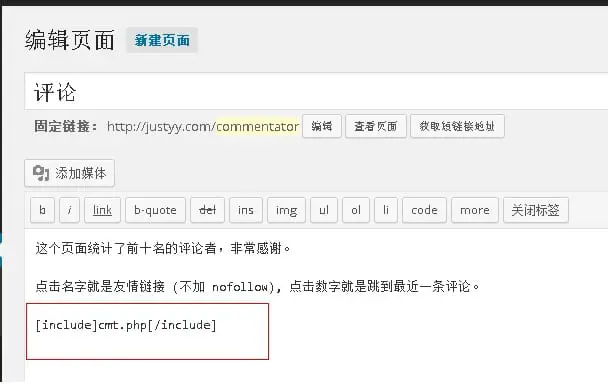WordPress is based on PHP and MySQL. So it is very flexible and powerful. This article will guide you how to create a page that shows the comment statistics for your blog. For example, a table with two columns, the author and the number of their comments.
In order to enable PHP code, you will need to install a plugin that allows you to include PHP code in your posts/pages. My recommendation is to search for [Simple Include HTML and PHP] at your wordpress control panel.
Then, you need to create a page that at least has the following (marked in red).

WordPress plugin to show comment statistics
Then go to your folder of the theme and create a file which is named cmt.php and set the file access mode to 644 (or at least readable).
The PHP code to fill in the file is:
1
2
3
4
5
6
7
8
9
10
11
12
13
14
15
16
17
18
19
20
21
22
23
24
25
26
27
28
29
30
31
32
33
34
35
36
37
38
39
40
41
42
43
44
45
46
47
| <?php
//https://helloacm.com
global $wpdb;
$query = "
select
`comment_author`,
`comment_author_url`,
count(1) as `cnt`
from
`wp_comments`
where
`comment_approved` = 1
group by
`comment_author`
order by
`cnt` desc
limit 10
";
$result = $wpdb->get_results($query);
if ($result) {
echo "<table width='100%' style='border:0'>";
echo "<tr><b><td>Author</td><td>The Number of Comments</td></b></tr>";
foreach ($result as $author) {
echo "<tr>";
$a = esc_sql($author->comment_author);
$query = "
select
`comment_post_id`,
`comment_id`
from
`wp_comments`
where
`comment_approved` = 1 and
`comment_author` = '$a'
order by
`comment_date` desc
limit 1
";
$latest = $wpdb->get_row($query);
echo "<td><a href='$author->comment_author_url' target='_blank' title='$author->comment_author'>".$author->comment_author."</a></td>";
echo "<td><a title='$author->comment_author' href='/archives/$latest->comment_post_id/#comment-$latest->comment_id'>".$author->cnt."</a></td>";
echo "</tr>";
}
echo "</table>";
}
?> |
<?php
//https://helloacm.com
global $wpdb;
$query = "
select
`comment_author`,
`comment_author_url`,
count(1) as `cnt`
from
`wp_comments`
where
`comment_approved` = 1
group by
`comment_author`
order by
`cnt` desc
limit 10
";
$result = $wpdb->get_results($query);
if ($result) {
echo "<table width='100%' style='border:0'>";
echo "<tr><b><td>Author</td><td>The Number of Comments</td></b></tr>";
foreach ($result as $author) {
echo "<tr>";
$a = esc_sql($author->comment_author);
$query = "
select
`comment_post_id`,
`comment_id`
from
`wp_comments`
where
`comment_approved` = 1 and
`comment_author` = '$a'
order by
`comment_date` desc
limit 1
";
$latest = $wpdb->get_row($query);
echo "<td><a href='$author->comment_author_url' target='_blank' title='$author->comment_author'>".$author->comment_author."</a></td>";
echo "<td><a title='$author->comment_author' href='/archives/$latest->comment_post_id/#comment-$latest->comment_id'>".$author->cnt."</a></td>";
echo "</tr>";
}
echo "</table>";
}
?>
Clicking the [Author] will navigate to the URL provided (in new window), and clicking the [The number of Comments] will lead to their latest comment. The URL format may need to be adjusted if it is not the standard one [/archives/post_id].
The example page can be viewed here: https://justyy.com/commentator (in Chinese).
The PHP function mysql_real_escape_string() is depreciated but you can still use esc_sql or $wpdb->prepare() to escape strings (containing single or double quotes) for SQL/database.
–EOF (The Ultimate Computing & Technology Blog) —
GD Star Rating
loading...
551 words
Last Post:
How To Block Google Domains in Adsense? Next Post:
Using Absolute Keyword in Delphi to Remove Unnecessary Assignment Function
How to Create a WordPress Page that Shows Comment Statistics?
WordPress is based on PHP and MySQL. So it is very flexible and powerful. This article will guide you how to create a page that shows the comment statistics for your blog. For example, a table with two columns, the author and the number of their comments.
In order to enable PHP code, you will need to install a plugin that allows you to include PHP code in your posts/pages. My recommendation is to search for [Simple Include HTML and PHP] at your wordpress control panel.
Then, you need to create a page that at least has the following (marked in red).
WordPress plugin to show comment statistics
Then go to your folder of the theme and create a file which is named cmt.php and set the file access mode to 644 (or at least readable).
The PHP code to fill in the file is:
<?php //https://helloacm.com global $wpdb; $query = " select `comment_author`, `comment_author_url`, count(1) as `cnt` from `wp_comments` where `comment_approved` = 1 group by `comment_author` order by `cnt` desc limit 10 "; $result = $wpdb->get_results($query); if ($result) { echo "<table width='100%' style='border:0'>"; echo "<tr><b><td>Author</td><td>The Number of Comments</td></b></tr>"; foreach ($result as $author) { echo "<tr>"; $a = esc_sql($author->comment_author); $query = " select `comment_post_id`, `comment_id` from `wp_comments` where `comment_approved` = 1 and `comment_author` = '$a' order by `comment_date` desc limit 1 "; $latest = $wpdb->get_row($query); echo "<td><a href='$author->comment_author_url' target='_blank' title='$author->comment_author'>".$author->comment_author."</a></td>"; echo "<td><a title='$author->comment_author' href='/archives/$latest->comment_post_id/#comment-$latest->comment_id'>".$author->cnt."</a></td>"; echo "</tr>"; } echo "</table>"; } ?>Clicking the [Author] will navigate to the URL provided (in new window), and clicking the [The number of Comments] will lead to their latest comment. The URL format may need to be adjusted if it is not the standard one [/archives/post_id].
The example page can be viewed here: https://justyy.com/commentator (in Chinese).
The PHP function mysql_real_escape_string() is depreciated but you can still use esc_sql or $wpdb->prepare() to escape strings (containing single or double quotes) for SQL/database.
–EOF (The Ultimate Computing & Technology Blog) —
loading...
Last Post: How To Block Google Domains in Adsense?
Next Post: Using Absolute Keyword in Delphi to Remove Unnecessary Assignment Function
Related posts: